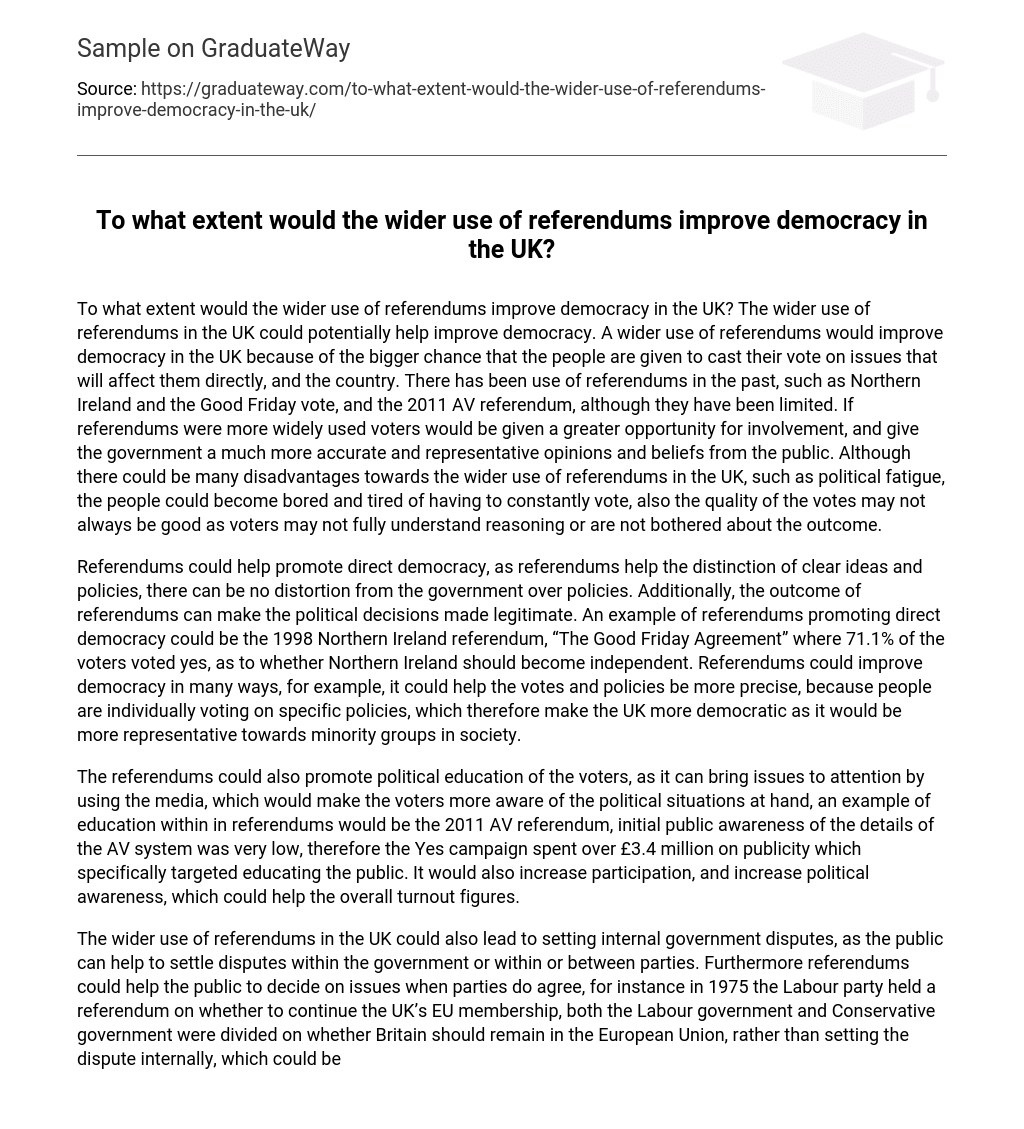The wider use of referendums in the UK could potentially help improve democracy. A wider use of referendums would improve democracy in the UK because of the bigger chance that the people are given to cast their vote on issues that will affect them directly, and the country. There has been use of referendums in the past, such as Northern Ireland and the Good Friday vote, and the 2011 AV referendum, although they have been limited.
If referendums were more widely used voters would be given a greater opportunity for involvement, and give the government a much more accurate and representative opinions and beliefs from the public. Although there could be many disadvantages towards the wider use of referendums in the UK, such as political fatigue, the people could become bored and tired of having to constantly vote, also the quality of the votes may not always be good as voters may not fully understand reasoning or are not bothered about the outcome.
Referendums could help promote direct democracy, as referendums help the distinction of clear ideas and policies, there can be no distortion from the government over policies. Additionally, the outcome of referendums can make the political decisions made legitimate. An example of referendums promoting direct democracy could be the 1998 Northern Ireland referendum, “The Good Friday Agreement” where 71.1% of the voters voted yes, as to whether Northern Ireland should become independent. Referendums could improve democracy in many ways, for example, it could help the votes and policies be more precise, because people are individually voting on specific policies, which therefore make the UK more democratic as it would be more representative towards minority groups in society.
The referendums could also promote political education of the voters, as it can bring issues to attention by using the media, which would make the voters more aware of the political situations at hand, an example of education within in referendums would be the 2011 AV referendum, initial public awareness of the details of the AV system was very low, therefore the Yes campaign spent over £3.4 million on publicity which specifically targeted educating the public. It would also increase participation, and increase political awareness, which could help the overall turnout figures.
The wider use of referendums in the UK could also lead to setting internal government disputes, as the public can help to settle disputes within the government or within or between parties. Furthermore referendums could help the public to decide on issues when parties do agree, for instance in 1975 the Labour party held a referendum on whether to continue the UK’s EU membership, both the Labour government and Conservative government were divided on whether Britain should remain in the European Union, rather than setting the dispute internally, which could be seen as undemocratic, the government thus decided to hold a referendum on the matter, the outcome of the was that the UK shall remain part of the EU.
A further advantage as to why the UK would benefit from the wider use of referendums could also be that they would help to settle regional issues. Referendums would allow groups in society to decide on issues that affect them directly. Additionally, the results would be politically binding as to what the public have voted. For example in 1997 there were referendums held on the Scottish and Welsh devolution, which created, devolved assemblies.
Although it could possibly also be argued that the wider use of referendums in the UK could pose as more of a disadvantage than an advantage, such as the risk of the lack of voter knowledge and understanding, which would affect the quality of votes, politicians have greater expertise, and also some referendum campaigns can mislead voters, as in the 2011 electoral commission criticised the initial wording of the AV referendum. Other disadvantages also include, government control and manipulation, as the government gets to decide when the referendums are held and control the wording, this can lead them to benefitting themselves.





